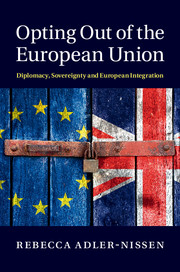By developing a political sociology of European integration, Rebecca Adler-Nissen aims to show how everyday negotiations transform national interests into European ideals. Amani El Sehrawey finds the book to be a useful read for EU scholars who wish to further examine the issue of national opt outs.
 Opting Out of the European Union: Diplomacy, Sovereignty and European Integration. Rebecca Adler-Nissen. Cambridge University Press. 2014.
Opting Out of the European Union: Diplomacy, Sovereignty and European Integration. Rebecca Adler-Nissen. Cambridge University Press. 2014.
Find this book: ![]()
When the 1992 Maastricht Treaty granted the UK and Denmark opt-outs in two major policy areas – the Economic and Monetary Union (EMU) and the Area of Freedom, Justice, and Security (AFSJ )- mainstream critics saw it as a harbinger of a “Europe in bits and pieces” (p.2).
In Opting Out of the European Union, Rebecca Adler-Nissen challenges this assumption and poses an alternative. She suggests that the opt-outs actually reinforce integration and signal a retreat from concepts of national sovereignty. Opt-outs provide stigmatisation in an arena where sovereignty claims are viewed as inappropriate (p.3). Adler-Nissen argues that the management of opt-outs by the UK and Denmark provide evidence of the strength of European integration and the difficulty of maintaining sovereignty claims within the complex system.
Adler-Nissen argues that IR and European integration theories prove inefficient to describe the phenomenon of opt-outs, and instead roots her argument in political psychology. She describes European integration as a social process driven primarily by social hierarchies, norms, reputation, and everyday diplomacy of politico-administrative elites rather than by the public, parliaments, and other domestic actors (p.18). Because of this, social stigmatisation associated with opt-outs is a powerful determinant of opt-out management. The bulk of Adler-Nissen’s work analyses the British and Danish opt-outs of both EMU and AFSJ. She argues that the primary reaction to the opt-outs is stigmatisation, and punishment of Britain and Denmark for their decisions to stay outside the system (p.75). However, the two countries react differently to this stigmatisation (p.75). Adler-Nissen points to two main streams of opt-out management in this environment: stigma rejection and stigma recognition (p.69).
In the case of EMU, ‘euro-outsiderness’ means exclusion from the powerful Eurogroup, which takes place before ECOFIN meetings and has increasingly become the arena in which major economic policy decision-making takes place. The opt-outs are also viewed as isolationist choices that cultivate a reputation of Britain and Denmark as “bad Europeans”. However, as Adler-Nissen notes, despite their voluntary exclusion from the Euro, the opt-outs countries have actively fought their exclusion from these policy discussions (p.99). Britain in particular consistently draws attention to their position as outsiders as a form of stigma management—this serves to solidify their public image as deviants of the system, which then justifies and perpetuates their exclusion (p.100). Adler-Nissen suggests that because of this, Britain’s stigma rejection as a tactic to challenge their exclusion from the negotiation table has been ineffective (p.100). For instance, Britain’s attempt to influence the SGPII reform to push EMU away from the Euro proved unsuccessful (p.109). Denmark, in contrast, has chosen stigma recognition as their opt-out management strategy. Here, Denmark acts as a “model country” in their economic performance, their fixed exchange rate bound to the euro, and their attempt in 2000 to abolish the EMU opt-out (p.105). Overall however, their status as an opt-out country limits their influence. This stigma takes place in the day-to-day European diplomatic space: the working groups and committees, specifically in the Eurogroup and ECOFIN (p.111). It is driven by socially negotiated norms at EU-level, rather than dictated by domestic factors (p.111). Stigmatisation, Adler-Nissen argues, must continue to ensure solidarity among euro-insiders (p.113).
The AFSJ is another policy area where major Danish and British opt-outs take place, and which Adler-Nissen examines as further proof of her argument. Britain operates partially outside of Schengen, with the option to opt-in to legislation. The UK challenges the scope and application of Schengen protocol— part of their stigma rejectionist opt-out management (p.125). They petitioned for inclusion in Frontex and passport biometrics policies but lost the case in front of the ECJ. Despite this, the UK decided to adopt parallel policies on the domestic level (p.126). Generally, the UK seeks to opt in as much as possible. Not opting in, in a field that values participation, harms its image (p.132). Opting in means fuller ability to influence decisions in this important policy area (p.132).
Denmark implements the Schengen protocols on an intergovernmental rather than a supranational basis (p.136). Although Denmark opted out of a supranational AFSJ, it was required to join the Schengen Agreement when Sweden and Finland joined, in order to maintain the preexisting Nordic Passport Union (p.118). Danish stigma recognition regarding their position as an opt-out country in AFSJ has given them a more favorable view in the eyes of their European colleagues than Britain (p.137). While the British often choose to provoke the system and their position as outsiders, the Danes attempt to hide their opt-outs and exercise restraint at the negotiation table (p.138). As the AFSJ has seen an explosion of new policy developments since the 1990’s, Britain and Denmark have attempted to influence policies in this area, even with legal provisions and stigma preventing them in some instances (p.145). However, the greater the policy area grows at the European level, the less room they have to operate while still staying within the social norms of the field (p.146).
Adler-Nissen offers an analysis of the opt-out phenomenon founded in political sociological frameworks—a perspective that is not heavily represented in more mainstream IR and European integration-based theoretical traditions. Rather than weaken the EU, opt-outs, and the stigmatisation associated with them, solidify the social norms surrounding behaviours on the European stage, and is an important part of the process of constructing European norms and a shared moral order in the EU (p.189). This book provides a detailed look at this process, and provokes thought about the continuation of opt-outs within the EU system.
The book may prove a bit obtuse for general readers as it delves deep into complex areas of the EU, and assumes a relatively high degree of literacy in EU affairs and EU institutional knowledge. Experts in the field may find it at times over-explanatory; there is a lot of time devoted to literature review of the foundations of political psychology before the frameworks were applied to the European case. As a scholar with less familiarity in the field of political psychology, I found this useful, but it could have perhaps been delivered more concisely. The application of Adler-Nissen’s frameworks to the case studies of EMU and AFSJ, however, were well-paced and persuasively argued. It is a useful read for EU scholars who wish to further examine the opt-out issue from outside the mainstream theoretical interpretations in this field.
This article gives the views of the author, and not the position of LSE BrexitVote, nor of the London School of Economics. It first appeared on the LSE EUROPP blog. Featured image credit: Kalyan Neelamraju (CC-BY-SA-3.0)
Amani El Sehrawey recently completed her Master’s degree in European Public Policy from King’s College London. She also holds a BA (Hons) from Boston University in International Relations and Muslim Studies. Her Master’s dissertation research focused on British and French policies towards Muslim minority integration. Her research interests include immigration and integration policy, European governance, and Middle Eastern politics. She is currently conducting research on European foreign policy and the future of the Common Foreign Security Policy.






